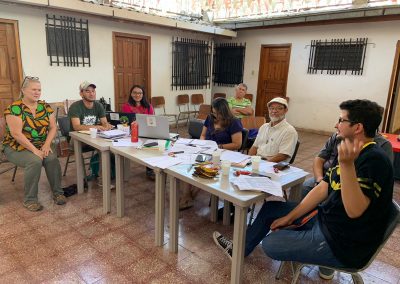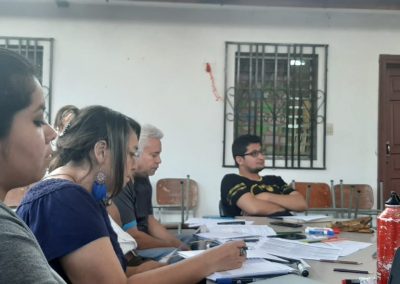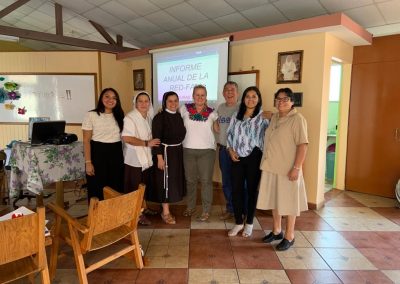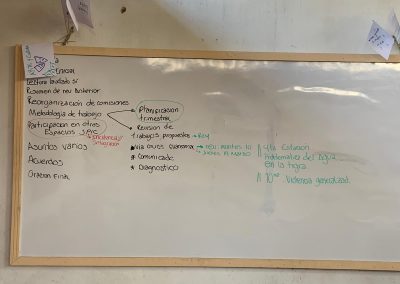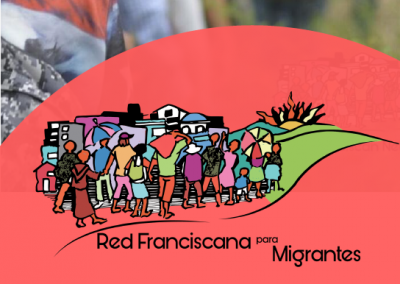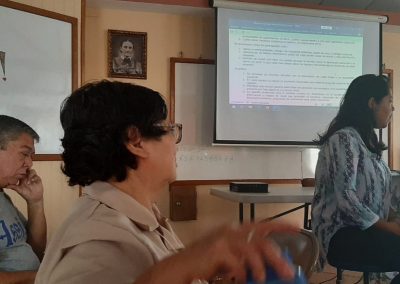The Franciscan Network on Migration’s team in Honduras (RFM-Honduras) is composed of Franciscan and other religious and lay people who minister in different areas of the country. Members of RFM-Honduras represent some of the initial organizers of the Network and over the past year they have worked to consolidate their team. Despite great geographic distances, communication challenges, and many other practical and spiritual commitments, they developed together a vision and strategy for their work on behalf of migrants and refugees.
Honduras is one of the main sending countries for people headed for Mexico and the US. Extreme poverty and violence, coupled with environmental degradation and political unrest have pushed individuals and families out of their homeland. Dreams of safety, refuge, and economic stability pull them northwards. RFM-Honduras is building a foundation upon which they can address the root causes of forced migration while at the same time providing emergency support to families who are being targeted and persecuted.
Sister Maria Elda described a time when people who live in her communities noted that within “15 days, 6 pastoral workers from the parish left, taking their smallest children with them but leaving the older kids with their mothers or with grandmothers. That is what moves my heart and what moves many of the hearts in this Network. We cannot remain indifferent to this reality, this emergency where there is so much need, because as I said, in truth we know the cause is violence. Climate change is also harming many people,” says Sr. Maria Elda.
“People have been left without their harvest, with so many high-interest loans. And when they fail to pay, they have to migrate to get a job and pay these debts because if the do not, they are threatened, the lives of their children are threatened, their own lives.”
Life in Honduras holds many risks, and one of the greatest is violence and organized crime. Every day, the gangs are stronger, and this has generated an alarming level of poverty. Moreover there few job opportunities, especially for young people. And although Sr. Maria Elda says that she doesn’t live in a border region, she lives next door to many who are the victims of violence and forced migration. She comments, “This is why I cannot remain indifferent. Everyday people leave, perhaps in a caravan, perhaps by groups of 5 or 10, it has not stopped even for one day. Every day Hondurans leave, Guatemalans leave, Salvadorans leave and people are leaving from my land, from my town, from my village, from my canton. I cannot remain indifferent, I cannot stand idly by with my mouth closed, I have to do something,” she stated.
RFM-Honduras has forged a strategy with three pillars: organizing, formation, and advocacy. During their first year they have interfaced with JPIC, including hosting a visit from the JPIC director, Fray Jaime Campos, participating in the Migrant Way of the Cross with La 72 in southern Mexico, and convening an assembly of roughly 40 people to introduce the RFM in Tegucigalpa. Out of that assembly, a coordinating team was formed and has in turn organized local teams at Maximiliano Kolbe Parish, at the diocesan level in Juticalpa (three Franciscan parishes and one Franciscan conventual parish), as well as with the congregation of the Hermanas Cooperadoras. They are also working closely with CONFEREH (the Conference of Honduran Religious) and the Sisters of the Holy Rosary.
One member of the team, Vicki, explains it this way: “To organize as a network of Franciscans in attention to migrants is to seek to respond in an organized, systematic and committed way to the accompaniment of people forced to forced migration. This human sensitivity joins with our call to be disciples of Jesus, together with the Franciscan spirituality of JPIC that sends us to care for and defend life where it is threatened, to be with the most vulnerable of the Kingdom. From the guidance of Pope Francis, together with the local pastoral work, we seek to accompany, care for, promote and integrate people in migration. As a Franciscan family we are in different spaces and present in different ways in all the countries of the region, as we are very much a family, with diverse personal and professional possibilities, as well as resources in infrastructure that can be at the service and in solidarity with migrants.”
In 2020, the team will focus on consciousness-raising that will generate commitments and inspire concrete actions appropriate to the local circumstances. By the end of 2020 they aim to have a team working on migration issues in every Franciscan parish in Honduras. These teams will be critical to their success because they will determine the national objectives from the front lines. At present, the national team is creating a series of workshops to implement with the teams at the parish level. They aim to implement three workshops this year, one that will be offered broadly and two that will be offered regionally.
“With all our heart and with all our enthusiasm we want to help in the best possible way and by organizing here in Honduras to be able to receive urgent cases that are presented to us, brothers and sisters who have to leave the country due to circumstances beyond their control because what awaits them is death, and persecution. That is why we as a conference are supporting this initiative.” — Sr. Ludi
Executive Secretary


